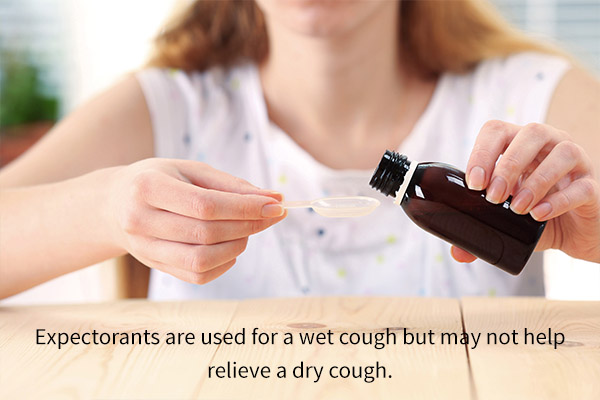In this article:
Cough is a natural defense reflex of a healthy body and serves to protect the respiratory passages from external threats.

Whenever a germ, dust, pollen, or any other irritant enters your respiratory tract, the immune system triggers an increased secretion of mucus to trap the invader. The body then coughs out these excessive respiratory secretions.
You can also develop a cough in response to fluid retention in the lungs.
How Common Is Cough?
Nearly 12 million people visit the physician’s clinic due to cough every year, making it a leading cause of primary care consultations all over the world. (1) This condition reportedly affects 10%–33% of the general population annually, including people of all ages and genders. (2)
However, chronic cough is more prevalent among older adults aged between 50 and 60 years, with a significantly higher incidence in females than in males. (3)
How Long Does a Cough Last?
Cough can be acute or chronic depending on how long it lasts.
- Acute cough usually subsides within 3 weeks.
- Chronic cough is more long term and persists for more than 8 weeks in adults and 4 weeks in children. (4)
Types of Cough
Chronic (or persistent) cough has several types:
1. Dry cough
A dry cough is a persistent cough that presents without any mucus production and is usually triggered by an upper airway inflammation or viral infection. Due to the lack of moisture, the forceful coughing can cause friction and irritation within the throat and lungs.
2. Chronic wet cough
Chronic wet cough expels mucus/phlegm/sputum, which may be of different colors depending upon the underlying cause. In most cases, a wet cough is either a sign of bacterial infection or fluid in the lungs (congestive heart failure).
3. Barking cough
Barking cough is most common in children suffering from croup or other viral illnesses that cause inflammation or swelling inside the windpipe, resulting in the distinctive barking sound when the patient coughs.
4. Whooping cough
Whooping cough, or pertussis, is a highly contagious bacterial infection that is characterized by severe, uncontrollable coughing spells. The cough has a “whooping” sound due to the high-pitched influx of air when you breathe in.
This respiratory infection requires timely medical evaluation by a doctor and can be especially life-threatening for infants below the age of 1 year.
Causes of Cough
Learn more about the reasons why we cough.

Common causes of acute cough include:
- Common cold
- Influenza (flu)
- Pneumonia
- Whooping cough
- Inhaling an irritant (such as smoke, dust, chemicals, or a foreign body)
Common causes of chronic cough include:
- Allergies
- Asthma (most common in children)
- Bronchitis
- Gastroesophageal reflux disease (GERD)
- Postnasal drip (when the mucus runs down the back of your nose to your throat)
Others causes of cough include:
- Smoking, vaping, marijuana use
- Bronchiectasis (a chronic lung condition in which an abnormal widening of the bronchial tubes inhibits mucus clearing)
- Bronchiolitis (inflammation of the smallest part of the lung, especially in young children)
- Emphysema/chronic bronchitis
- Chronic obstructive pulmonary disease (COPD)
- Croup (especially in young children)
- Cystic fibrosis
- Acute or chronic sinusitis
- Heart failure
- Laryngitis
- Lung cancer
- Medications called angiotensin-converting enzyme (ACE) inhibitors, which are used to treat high blood pressure and cardiovascular disease
- Neuromuscular diseases that weaken the coordination of the upper airway and swallowing muscles
- Pulmonary embolism (blood clot in an artery in the lung)
- Respiratory syncytial virus (RSV), especially in young children
- Sarcoidosis (collections of inflammatory cells in the body)
- Tuberculosis
- Lung collapse or pneumothorax
- Hay fever
- Laryngopharyngeal reflux)
Symptoms of Cough
Coughing in and of itself is not a medical condition but a symptom of an underlying condition. It can occur as the only symptom of an illness or can co-occur with other symptoms, such as in diseases of the lung, heart, stomach, and nervous system.
The most frequently reported symptoms that may accompany a cough include:
- Running out of breath
- Decreased ability to tolerate exercise
- Wheezing or a whistling sound during breathing
- Runny nose
- Sore throat
- Heartburn
- Unexplained weight loss
- Fever and chills
- Night sweats
- Pain or cough while swallowing
Medical Treatment for Cough

The most commonly prescribed medications for cough are as follows:
1. Expectorants
Expectorants, such as guaifenesin, are widely used to dilute the consistency of mucus or phlegm to facilitate its easy expulsion through coughing. They are used for a wet cough but may not help relieve a dry cough, which presents without sputum production.
2. Cough suppressants
Cough suppressants are considered safe and effective for reducing the cough reflex in both adults and children.
While OTC suppressants such as dextromethorphan may relieve cough and the related throat discomfort to a certain degree, they may be less effective than prescription-strength cough syrups.
Cough syrups are usually associated with drowsiness and other side effects, but some are safer than others, such as cough suppressants containing glycerol with the flavor of honey and lemon. (5)(6)
3. Decongestants
Decongestants help reduce cough-related nasal congestion by shrinking swollen nasal tissue and curbing mucus secretion in the respiratory tract.
4. Proton pump inhibitors
Proton pump inhibitors are prescribed for GERD-induced cough. They inhibit the activity of the glands lining the stomach that are responsible for producing gastric acids, thereby reducing the acidity of acid reflux.
5. Anti-Inflammatories
Anti-inflammatories, such as paracetamol and ibuprofen, may be prescribed for managing fever and reducing the symptomatic discomfort associated with cough, such as soreness in the throat.
6. Antibiotics
Antibiotics kill only bacteria. As most causes of cough are not caused by bacteria, antibiotics are unlikely to provide any significant relief from cough in most cases but may cut down recovery time by less than a day. (7)
Diagnosis

Several different conditions can trigger a cough, and the treatment of the cough varies according to the underlying cause. Thus, you need to seek proper medical evaluation for a proper diagnosis, since the cough can only be treated once the cause is known.
This diagnosis process typically involves:
1. Medical history
Your doctor will first take into account your complete medical history, which includes:
- Symptoms
- Previous or preexisting ailments
- Diseases that run in the family
- Medications that you are currently on or were taking in the recent past, both prescription and OTC
2. Physical examination
The doctor may:
- Inspect your oral cavity, throat, and tonsils
- Feel the lymph nodes in your neck for signs of swelling
- Check your breathing rate
- Listen to the sound of your lungs and heart using a stethoscope
3. Tests
The doctor may order the following diagnostic tests to determine any dysfunction or signs of infection inside the body:
- Lung function tests
- Chest X-ray
- Chest CT
- Blood tests
- Allergy tests
- Bronchoscopy with or without lung biopsy
- Esophagoscopy
- Nasal endoscopy
- Sinus CT
- Spirometry
When to See a Doctor
Cough is your body’s way of eliminating any foreign or undesirable elements from the respiratory tract. It is generally not a cause for concern, but you may require special medical attention in the following cases:
- If the cough does not subside despite proper self-care and treatment
- If you run a high body temperature along with the cough
- If you notice any new symptoms or changes in the type of cough
- If you begin coughing up blood
- If the cough is so severe that it keeps you from performing your daily activities and disturbs your sleep
- If you experience shortness of breath or difficulty breathing, which qualifies as an emergency
Final Word
Coughing is a sign that your body is striving to get better by ridding your respiratory tract of excess mucus, germs, allergens, or other irritants that are perceived as external threats.
Expectorants, cough suppressants, allergy medicines, decongestants, and inhalers are some of the most commonly prescribed medicines for regular coughing spells. For best results, these pharmacological interventions must be coupled with proper self-care measures.

- Was this article helpful?
- YES, THANKS!NOT REALLY


